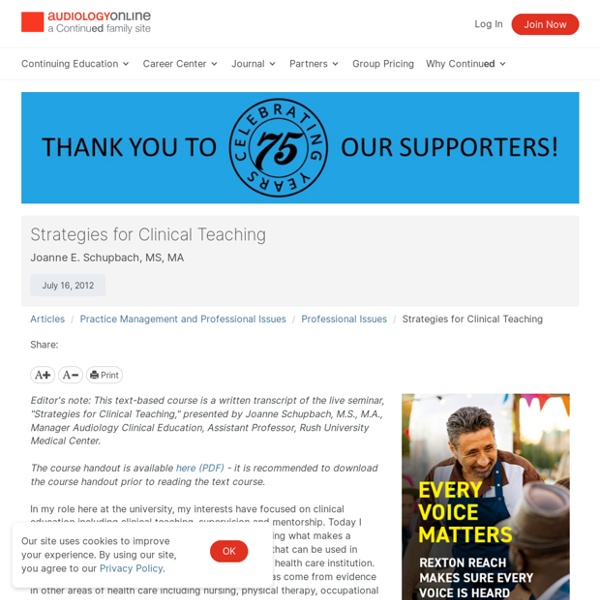School of Communication Sciences and Disorders
To assist Clinical Educators (CEs) in providing students with high quality practicum experiences we have developed a range of resources. Jump to: Obtaining Professional Associate Status with McGill University Please contact lili.saran@mcgill.ca if you wish to enquire about obtaining Professional Affiliate status with McGill University. The Collaborative Approach to Clinical Education Jeanne Claessen, Former Head of Clinical Program (1995-2009) School of Communication Sciences and Disorders McGill University
7 Steps for Onboarding a Therapist into clinical supervision — Family Therapy Basics
Clinical supervisors are lifelines for therapists. As a newly graduated therapist seeking licensure, my supervisors guided me in theory, practice, self-of-the-therapist matters, and more. I not only felt competent once I received my license, I felt confident. I decided to become an AAMFT-Approved supervisor, and a supervisor for supervisors, because of the mentoring and valuable direction I received as a supervisee.
Focusing in on Tele-supervision
We use cookies to offer you a better browsing experience, analyze site traffic, personalize content, and serve targeted advertisements. If you continue to use this site, you consent to the use of cookies. Read about how we use cookies and how you can control them by visiting our Cookie Statement.
Placement Models and Approaches to Supervision - ClinEdAus
Placement models and approaches to supervision in clinical education Student supervisors need to consider the range of placement options that are available when deciding to offer a clinical education placement. You need to think about your specific work context and decide what type of placement structure and approach is most appropriate.
Cultural Competence: Key Issues
Roles and Responsibilities Professional competence requires that audiologists and SLPs practice in a manner that considers the impact of cultural variables as well as language exposure and acquisition on their clients/patients and their family. ASHA-certified practitioners have met rigorous academic and professional standards, including knowledge of cultural variables and how they may influence communication. See ASHA's Scopes of Practice in Audiology and Speech Language Pathology as well as Audiology Certification Standards and Speech-Language Pathology Certification Standards. Clinicians are responsible for providing competent services, including cultural responsiveness to clients/patients/families during all clinical interaction. Responsiveness to the cultural and linguistic differences that affect identification, assessment, treatment, and management includes the following:
Mistakes to Avoid as a New Clinical Supervisor
Expanding your career as a therapist into one that includes providing clinical supervision is an exciting change! Supervision offers variety for your day, allows you to mentor others, can be highly rewarding, and gives you a chance to share the wisdom and experience you’ve acquired over the years. However, jumping into clinical supervision without preparation is, honestly, foolish. Here are a few mistakes to avoid when taking on your first supervisees. Using counseling skills for supervision You definitely will use some counseling skills during supervision, but they shouldn’t be ALL you use.
Evidence-Based Practice: An Opportunity for Continuing Education Providers
By Robert Mullen, Director, National Center for Evidence-Based Practice in Communication Disorders, ASHA Evidence-based practice (EBP) has emerged as an important principle in the delivery of speech-language pathology and audiology services in the past decade. ASHA uses the following definition of EBP: the integration of research evidence with practitioner expertise and client preferences and values into the process of making clinical decisions. Note that although this is referred to as "evidence-based" practice, the roles of clinician expertise and client preferences and values are equally important. The notion that external research evidence somehow "trumps" all other considerations is one of the big myths surrounding EBP.
Cultural Competence Check-Ins
Cultural competence, cultural humility, and culturally responsive services all are vital components to each professional interaction. ASHA has developed resources to help you reflect on your current level of cultural competence to improve service delivery. Cultural humility is a dynamic and complex process requiring ongoing self-assessment and continuous expansion of one's cultural knowledge. Cultural humility forces us to consider power balances and imbalances in our interactions providing a structure to examine personal and institutional accountability. Cultural competence is a necessary component in order to achieve clinical competence.
Issues in Ethics: Supervision of Student Clinicians
About This Document Published 2017. This Issues in Ethics statement is a revision of Supervision of Student Clinicians (originally published in 2003 and revised in 2010).
Knowledge and Skills Needed by Speech-Language Pathologists Providing Clinical Supervision
Ad Hoc Committee on Supervision in Speech-Language Pathology About this Document This knowledge and skills document is an official statement of the American Speech-Language-Hearing Association (ASHA). This knowledge and skills statement was developed by the Ad Hoc Committee on Supervision. Members of the committee were Lisa O'Connor (chair), Christine Baron, Thalia Coleman, Barbara Conrad, Wren Newman, Kathy Panther, and Janet E. Brown (ex officio).
Clinical Supervision in Speech-Language Pathology
Ad Hoc Committee on Supervision in Speech-Language Pathology About this Document This technical report was developed by the Ad Hoc Committee on Supervision in Speech-Language Pathology of the American Speech-Language-Hearing Association (ASHA). Members of the committee were Lisa O'Connor (chair), Christine Baron, Thalia Coleman, Barbara Conrad, Wren Newman, Kathy Panther, and Janet E.
Cultural Competence
Roles and Responsibilities Professional competence requires that audiologists and SLPs practice in a manner that considers the impact of cultural variables as well as language exposure and acquisition on their clients/patients and their family. ASHA-certified practitioners have met rigorous academic and professional standards, including knowledge of cultural variables and how they may influence communication. See ASHA's Scopes of Practice in Audiology and Speech Language Pathology as well as Audiology Certification Standards and Speech-Language Pathology Certification Standards. Clinicians are responsible for providing competent services, including cultural responsiveness to clients/patients/families during all clinical interaction. Responsiveness to the cultural and linguistic differences that affect identification, assessment, treatment, and management includes the following:
Knowledge and Skills Needed by Speech-Language Pathologists Providing Clinical Supervision
Ad Hoc Committee on Supervision in Speech-Language Pathology About this Document This knowledge and skills document is an official statement of the American Speech-Language-Hearing Association (ASHA).



